Ever wondered how your internet connection really works behind the scenes? A proxy server is one of the tools that silently powers and protects your web experience.
Instead of connecting directly to a website, your device sends requests through the proxy. The proxy then talks to the internet on your behalf, giving you a layer of privacy and control over how your connection works.
What is a proxy server?
A proxy server acts as a gateway between your device and the internet, helping to mask your IP address and provide privacy.
Why Do People Use Proxy Servers?
- 🌐 To hide their IP address for anonymity
- 🚫 To bypass geo-blocks or website restrictions
- ⚡ To speed up connections through caching
- 🛡️ To control network access and monitor usage (especially in businesses)
Whether you’re scraping data, accessing restricted content, or just browsing more privately, proxy servers play a big role.
In this guide, we’ll cover:
- How proxy servers work (in simple terms)
- The most common types of proxies
- When to use one and when not to
- How proxies compare to VPNs
- Real-world examples and answers to popular questions
Let’s start with the basics.
How Does a Proxy Server Work?
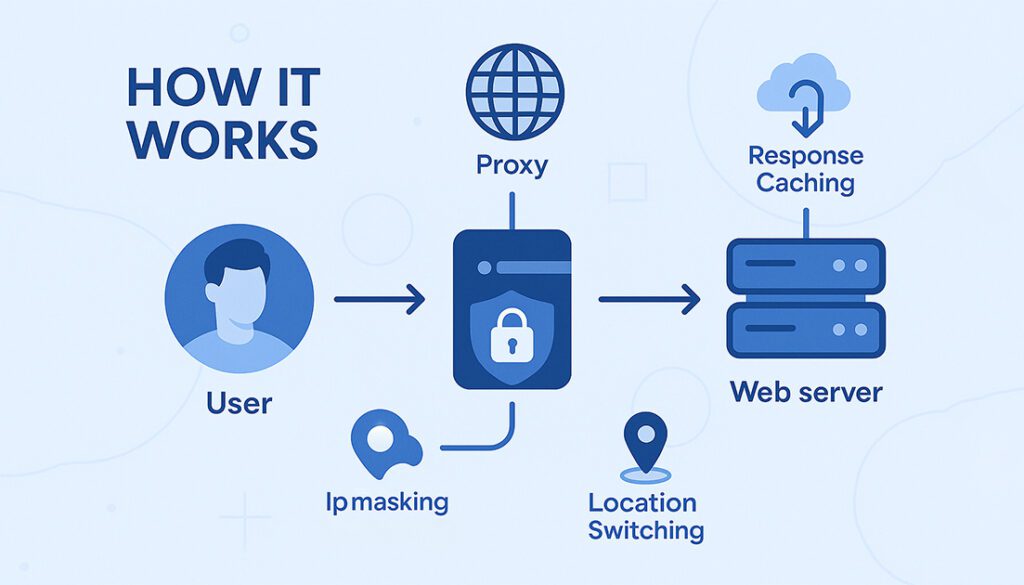
At its core, a proxy server is a go-between. Instead of your device connecting straight to a website, it sends that request to the proxy first. The proxy then contacts the website, retrieves the content, and sends it back to you.
This extra step allows the proxy to filter, modify, or anonymize your request before it reaches its destination.
📋 Simple Step-by-Step
- You enter a URL in your browser
- The request goes to the proxy server
- The proxy forwards the request to the target site
- The website responds to the proxy
- The proxy sends the response back to you
🕵️ What Happens in Between?
- IP address can be masked or replaced
- Requests may be filtered or logged
- Content can be cached for faster loading
- Traffic may be encrypted or modified
How does a proxy server improve security?
Proxies filter requests and can block malicious sites or content, providing an additional layer of security for users.
The proxy sits between you and the internet, managing traffic in both directions.
Next, we’ll look at the real advantages of doing that, starting with the key benefits of using a proxy.
Key Benefits of Using a Proxy Server
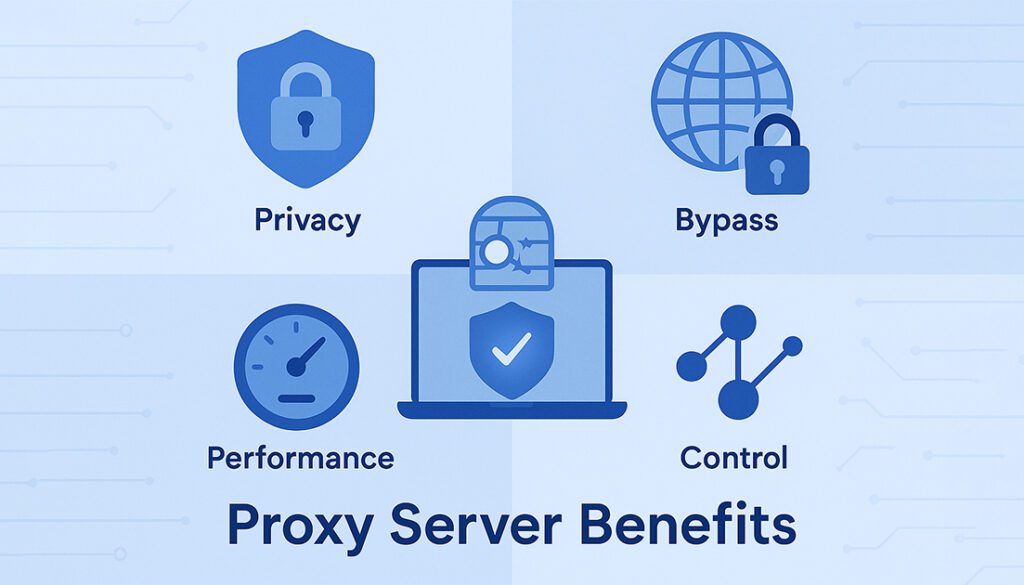
Proxy servers offer more than just privacy. They provide control, speed, and functionality that can enhance your entire internet experience. Whether you’re a casual user or a business managing networks, proxies can unlock serious advantages.
🛡️ Online Anonymity
- Hide your real IP address
- Prevent websites from tracking your location
- Protect personal data while browsing
🚫 Bypass Restrictions
- Access geo-blocked websites or content
- Unblock services limited by country or region
- Bypass school, work, or government firewalls
⚡ Faster Load Times
- Cache frequently visited content
- Reduce bandwidth usage and page load delays
- Improve speed for shared networks
⚙️ Network Control
- Filter or block specific websites
- Monitor employee or user activity
- Enforce company or school browsing policies
From boosting speed to enhancing security, proxies can serve many purposes depending on how they’re configured. But not all proxies are created equal.
Next up: a breakdown of the main types of proxy servers and how they differ.
Common Types of Proxy Servers Explained
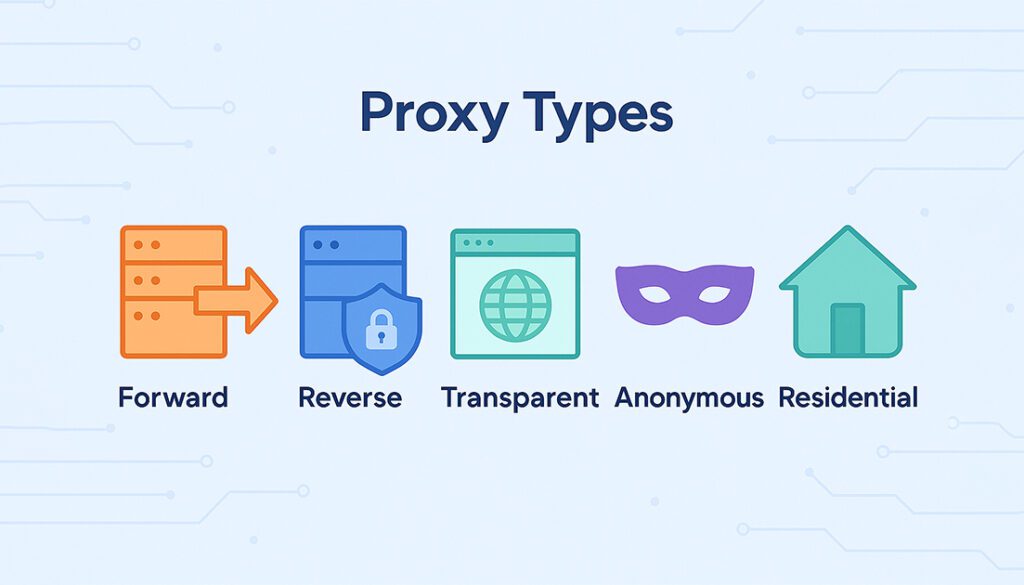
Not all proxies work the same way. Depending on your goals, anonymity, speed or control, certain proxy types will suit your needs better than others.
What are the main types of proxy servers?
Common types include forward and reverse proxies, transparent proxies, anonymous proxies, elite proxies and Datacenter or Residential proxies each offering different levels of privacy and security.
Here are the most common types of proxy servers and what sets them apart:
➡️ Forward Proxy
- Sits between the user and internet
- Used to control outbound traffic
- Common in personal and corporate use
🔁 Reverse Proxy
- Sits between the internet and a server
- Used to handle inbound traffic
- Improves security, load balancing, and caching
🌐 Transparent Proxy
- Doesn’t hide user IP
- Often used in public Wi-Fi or schools
- Users may not know it’s active
🕵️ Anonymous & Elite Proxies
- Hide or fully disguise IP address
- Elite (high anonymity) proxies offer the most privacy
- Best for bypassing strict filters
🏠 Residential vs Datacenter
- Residential: Real IPs from ISPs (less likely to be blocked)
- Datacenter: Cheaper, faster, but easier to detect
- Use depends on your goal: stealth vs speed
Each type serves a different purpose, some prioritize speed while others highlight security and some focus on anonymity.
Next, let’s look at when it actually makes sense to use a proxy server in your day-to-day activities or business workflows.
When Should You Use a Proxy Server?
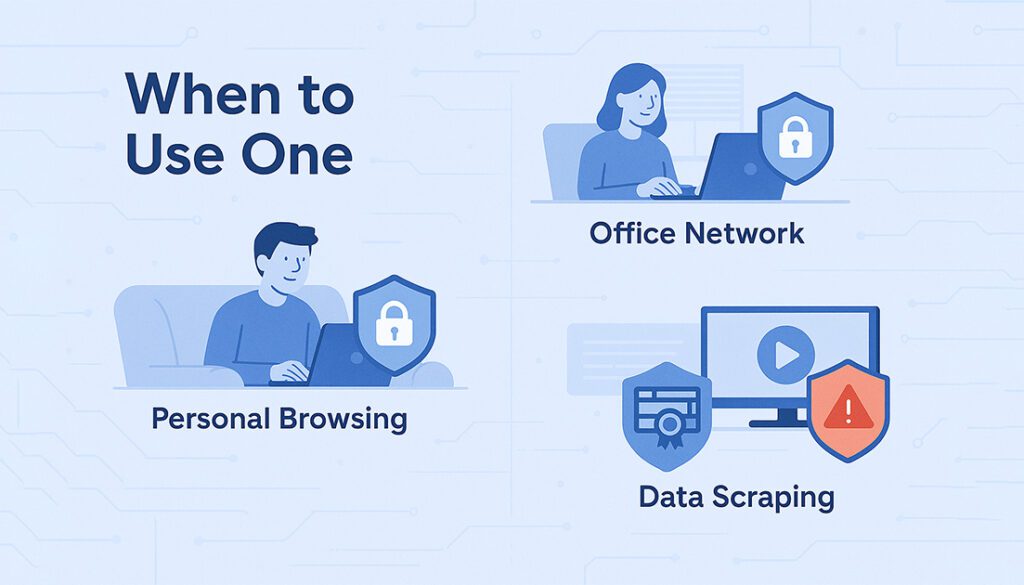
Proxy servers aren’t just for tech experts or businesses, they’re useful in everyday situations too. Whether you’re looking to boost your privacy or manage large-scale data tasks, proxies offer solutions tailored to different needs.
👤 Personal Browsing
- Stay anonymous online
- Bypass geo-blocks for streaming or websites
- Limit tracking and targeted ads
🏢 Business & Corporate Use
- Enforce internet usage policies
- Monitor employee activity securely
- Improve network performance and control
🧪 Automation & Scraping
- Gather data from websites at scale
- Avoid getting blocked or rate-limited
- Rotate IPs to mimic real users
📦 E-commerce & Market Research
- Track competitor pricing anonymously
- Check ad placements and product visibility
- Research across multiple locations
From casual privacy to advanced data scraping, proxies can be adapted for all kinds of tasks.
Can proxies be used for geo-restriction bypassing?
Yes, proxies can help access content restricted by geographic location by routing your traffic through servers in allowed regions.
Real-World Proxy Server Use Cases
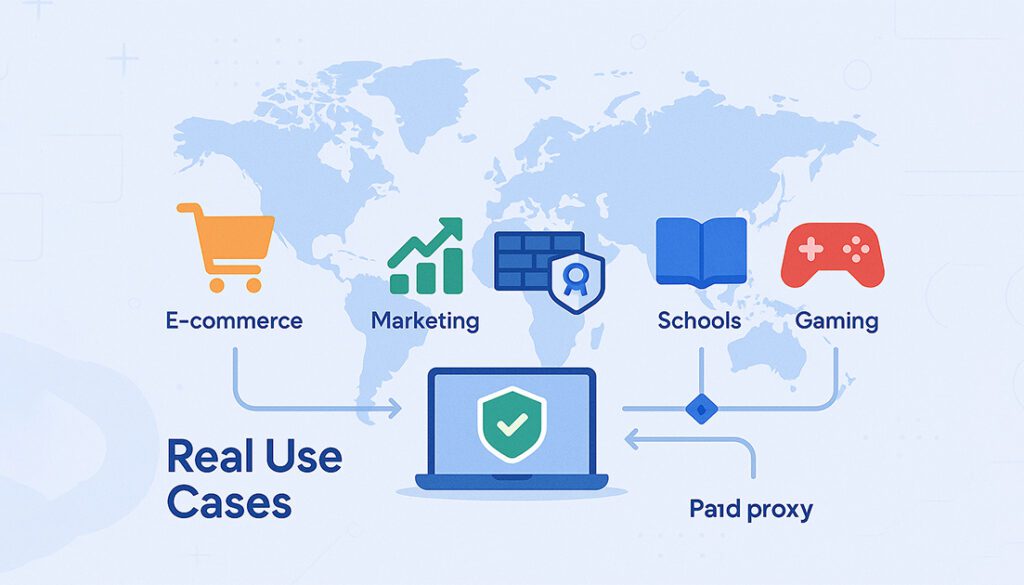
Proxy servers aren’t just theoretical tools. They’re widely used across industries, from digital marketing and IT to everyday browsing. Here are some real-life examples of how proxies solve real problems.
📊 Digital Marketing
- Run ad verification across regions
- Track search engine rankings from different locations
- Analyze competitor campaigns without being blocked
📦 E-commerce Monitoring
- Scrape pricing data across marketplaces
- Track product availability globally
- Ensure listings are accurate in target regions
🏫 School & Library Networks
- Block access to adult or harmful content
- Monitor student internet usage
- Filter websites based on category or time
🎮 Gaming & Streaming
- Bypass regional restrictions on content
- Access early releases or region-locked features
- Reduce ping or route traffic through specific regions
These use cases show just how flexible and powerful proxies can be in both everyday and enterprise settings.
Proxy Server vs VPN: Key Differences
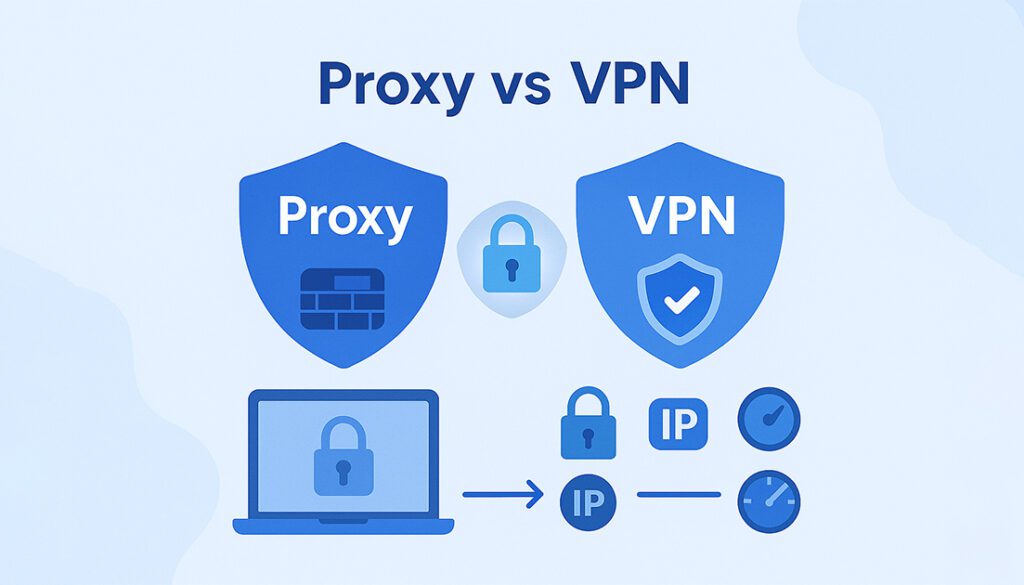
Both proxies and VPNs are used to hide your IP address and protect your identity, but they do it in very different ways. Here’s how they compare side by side:
| Feature | Proxy Server | VPN |
|---|---|---|
| IP Masking | ✅ Yes | ✅ Yes |
| Traffic Encryption | ❌ No | ✅ Full encryption |
| Speed | ⚡ Often faster (no encryption overhead) | ⚠️ Slightly slower due to encryption |
| System-wide Coverage | 🚫 Browser or app only | ✅ Entire device |
| Use Case | Web scraping, content access, basic anonymity | Privacy, secure browsing, unblocking censored content |
| Cost | 💲 Cheaper or free | 💰 Typically subscription-based |
❓ Which One Should You Use?
- 🔄 Use a proxy server when you need speed, IP rotation, or app-specific routing.
- 🛡️ Use a VPN if you’re looking for full privacy, data encryption, or device-wide protection.
You can even combine both in certain cases for layered privacy.
Frequently Asked Questions
What is a proxy server used for?
A proxy server is used to route your internet traffic through an intermediary. It helps hide your IP address, access restricted content, manage bandwidth, filter requests, or collect data anonymously.
Is a proxy server the same as a VPN?
No. A proxy server only hides your IP address and doesn’t encrypt your traffic. A VPN hides your IP and also encrypts all your internet activity, offering stronger security and privacy.
Are proxy servers legal?
Yes, using a proxy server is legal in most countries. However, what you do through a proxy (like bypassing geo-blocks or scraping restricted content) may violate website terms or local laws.
Can a proxy improve my internet speed?
Sometimes. Proxies can cache data or serve local content faster. But in other cases, especially with overloaded proxies, your connection may actually slow down.
What is the difference between residential and datacenter proxies?
Residential proxies use real IPs from internet service providers, making them harder to detect. Datacenter proxies are faster and cheaper but more likely to be flagged or blocked.
Do proxies work on all devices?
Most proxies are configured for specific apps or browsers, but some tools and services offer system-wide proxy support. Mobile, desktop, and browser-based use is all possible with the right setup.
Can I use a proxy for streaming?
Yes, but results vary. Some proxies can unblock geo-restricted content, while others get blocked by platforms like Netflix or Hulu. VPNs are often more reliable for streaming.
Are free proxies safe?
Not always. Many free proxies may log your data, inject ads, or expose you to security risks. Paid or reputable proxy services offer better safety, reliability, and performance.
Final Verdict
Used wisely, they’re a smart choice for both personal and business needs.
Looking to Try a Proxy or VPN?
Now that you know how proxy servers work, explore real-world tools to help you browse smarter. Check out our expert reviews of the best proxy providers and top-rated VPNs for privacy, speed, and flexibility.


